BSS's 60th anniversary
Wilhelmina Bladergroen
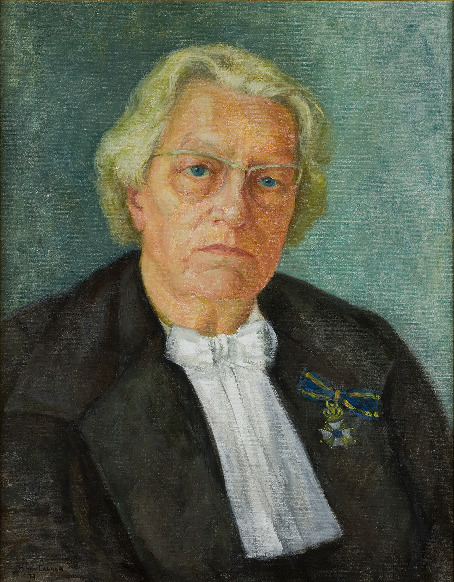
Professor of Orthopedagogy at the University of Groningen (1966-1978)
That she would become the first Groningen professor of Orthopedagogy, Amsterdam gymnastics teacher Wilhelmina Bladergroen will not have suspected. As a smart girl from a middle-class background, the choice to teach gymnastics was downright provocative. But Bladergroen was fascinated by the moving body and persevered. She obtained her Physical Education degree in 1930 and took up teaching. She also went on to study psychology. During the Second World War, she started a counselling practice for children with learning or behavioural problems. This practice grew into a school with a diagnostic centre and a boarding school - the first ‘Lomschool’ in the Netherlands (school for children with learning and educational difficulties). In 1949, the Rijksuniversiteit asked her for the position of lecturer in child psychology. She trained numerous students, set up a Child Psychology Institute and meanwhile kept her consulting practice and school going. In 1966, she was appointed professor of Orthopedagogy. That same year, she published the textbook Lichamelijke en geestelijke ontwikkeling van het kind (Physical and Mental Development of the Child), which was to become a bestseller.
Already during her studies, Wilhelmina Bladergroen combined her fascination for movement with child development. She coined the theory that children whose motorial or spatial development is disrupted at an early age can develop learning and behavioural problems. By going through those processes later, the problems could be reduced, Bladergroen argued. In conjunction, she campaigned for more play and movement space for children and the importance of play in pre-school education. She would become a national celebrity for it and appeared frequently on radio and television. From all over the country, parents consulted her institute when children experienced learning difficulties and she even treated some children of members of the royal family. The school she founded still exists: the Prof. W.J. Bladergroenschool. The school is part of RENN4 and has several branches in the province of Groningen. Bladergroen's theory on the link between exercise and learning has now been proven empirically on many occasions.
The Bladergroen wing can be found in the Nieuwenhuis building at Grote Rozenstraat 38, which currently houses the Pedagogical and Educational Sciences department.
Pieter Bouman
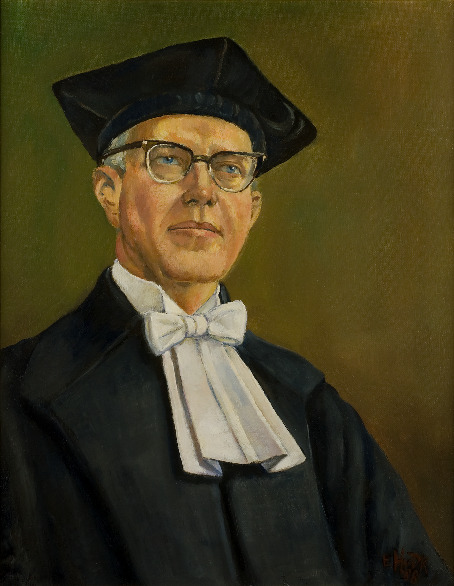
Professor of Sociology at the University of Groningen (1946-1960)
Pieter Bouman was a founder of Dutch sociology, the historian with the best-selling historical books in the twentieth century and an able administrator of the University of Groningen. While studying economics and history, his fascination for sociological processes arose. When he was appointed professor of sociology at the RUG in 1946, publications in these fields were decisive. His cultural sociological approach put him at the forefront of the field, evidenced among other things by his honorary membership of the Dutch Sociological Society.
Among his many publications is the bestseller Revolution of the Lonely, which has been translated into many languages. This study is both the story of a life and the portrait of an era, both a biography and a cultural history. A story of a life in an epoch with two world wars, great social changes, many ideologies and philosophies, and with a philosophy of progress as well as of decline. Bouman lived through all that and experienced it intensely. He suffered under his time but tried to rise above it by telling about it. He became a well-known Dutchman who maintained good relations with the Royal Family and in 1964 presented an honorary doctorate to Queen Juliana. He had great significance for Groningen University: he set up a fully-fledged sociology department, was intensively involved in the establishment of both the Faculty of Economic Sciences (1948) and the Faculty of Social Sciences (1964) and stimulated research by the Sociological Institute into living conditions in the region. From 1959 to 1960, he was Rector Magnificus.
The Bouman Building can be found at Grote Rozenstraat 31 and currently houses the Sociology Department.
Douwe Draaisma
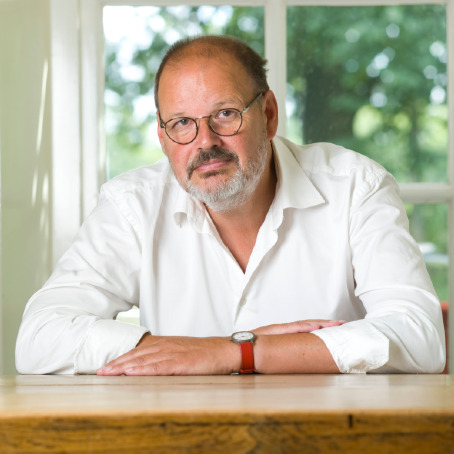
Associate professor of History of Psychology at the University of Groningen (2003-2019)
Douwe Draaisma studied psychology and philosophy at the University of Groningen. In 1993, he received his doctorate from psychologist Piet Vroon at Utrecht University for a thesis on the metaphorical nature of the language in which we think and speak about memory. The Metaphor Machine. A history of memory was published as a trade edition and immediately found a large audience. Draaisma's research focuses on written historical sources. He writes about them in an accessible way, not only for academic readers. He became widely known for his book Waarom het leven sneller gaat als je ouder wordt, in which he studies autobiographical memory. In it, he unravels, among other things, why we remember one thing and forget another and how it is possible that old events suddenly reappear in our memory.
Draaisma's work has been awarded many prizes, including the NWO Eureka Prize, and is translated into many languages. His publications are praised for their clear style and accessibility, even when discussing complex topics. Until his retirement in 2019, Draaisma held the Heymans Chair at our faculty. Nowadays, he is still active in academia as an honorary professor at the RUG.
Trudy Dehue

Professor of Theory and History of Psychology at the University of Groningen (1995-2016)
Her work as an observer in youth psychiatry sparked Trudy Dehue's interest in science. She studied psychology and philosophy of science, obtained her PhD on a study of the meaning of the terms ‘science’ and ‘objectivity’ in psychology, and then specialised in studying various social sciences. Her broad interests included not only psychology and psychiatry, but also brain science and genetic research. In 1995, Trudy Dehue was appointed professor of theory and history of psychology.
Besides publishing her PhD thesis and many articles in international scientific journals, Trudy Dehue writes pioneering books for a wider audience about her scientific research. In De depressie-epidemie (The Depression Epidemic) (2008), she questions the frequent use of antidepressants and relates this to cultural changes in the Netherlands.
De depressie-epidemie became a bestseller. It caused a major public debate and was awarded the NWO Eureka Prize 2009. In 2011, Trudy Dehue was appointed Officer in the Order of Orange-Nassau for her scientific achievements and her contributions to the public debate.
Mineke van Essen
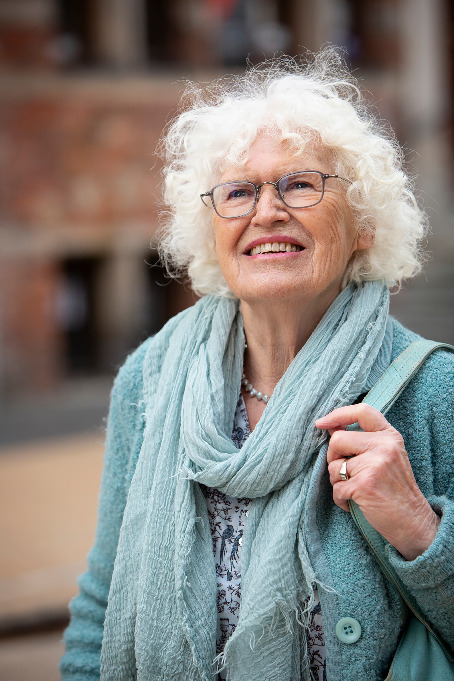
Endowed Professor of Gender Studies at the University of Groningen (1999-2007)
Fascinated by history from a young age, Mineke van Essen first went to the teacher training college after high school to become a teacher. She then studied history in Groningen and worked as a history teacher for many years. In 1985, she received her doctorate from the famous Groningen historian Kossmann on a study of the path women in the nineteenth century had to take to become a teacher, without any training. The interest in educational history, with a particular focus on the role of women, became the common thread of Mineke van Essen's research. She was appointed lecturer in historical pedagogy at the University of Groningen and, in 1999, endowed professor of Gender Studies.
Besides many publications in (inter)national scientific journals, Mineke van Essen was always driven to appeal to a wider audience through books that are based on sound scientific historical research but are written in an accessible way. Of great importance is her book on the origins and development of teacher training in primary education: Kwekeling tussen akte en ideaal (Teacher trainee between diploma and ideal) (2006). This book covers two centuries of educational history. Based on various sources, it tells the story of the path boys and girls from different backgrounds, genders and philosophies took to become a teacher, but above all, the discussion on what the training should look like. This is a question that is still relevant to today's teacher training and causes much debate. For her most recent book Onderweg naar 1832 (On the way to 1832) (2021), Mineke van Essen followed some pupils from even closer quarters. This resulted in a group portrait of six Groningen teachers who stood at the basis of the education system as we still know it today.
Ivan Gadourek
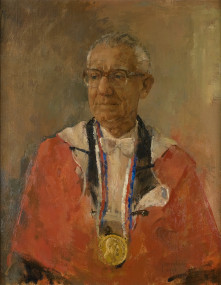
Professor of Sociology at the University of Groningen (1958-1985)
Ivan Gadourek is the founder of modern sociology in Groningen. Gadourek studied philosophy and sociology in Czechoslovakia, but fled to the Netherlands after the communist takeover in 1948. He took his scientific baggage with him in 11 notebooks. He learnt Dutch in record time, went to study sociology in Leiden and obtained his PhD there in 1953. In 1958, Gadourek was appointed professor of sociology in Groningen. There he grew into a leading methodologist and empirical researcher, who also let students do a lot of research. He published several pioneering studies, which used large-scale sampling and surveys - a time-consuming activity at the time because all the data had to be put on punch cards manually. His book on Dutch people's smoking and drinking habits and their link to well-being, Riskante gewoonten (Risky habits) (1963), made Gadourek known to a wide audience. His Magnum Opus, however, is the voluminous book Social change as redefinition of roles published in 1982. In it, Gadourek reports on one of the first large-scale panel studies in the Netherlands into the relationship between social change and changes in people's attitudes and beliefs.
With his empirical approach, Ivan Gadourek defined the signature of contemporary Groningen school of sociology. He retired in 1985. Throughout his life, Gadourek remained involved in developments in Czechoslovakia. With other refugees, he founded the Czechslovak Foreign Institute in Exile, for which, among other things, he distributed the newspaper Tribuna. After the fall of communism in 1989, he devoted himself to the development of sociology in the Czech Republic. For this, he received the prestigious Jan Masaryk Medal in 2004.
The Gadourek Building can be found at the Grote Rozenstraat 19 and currently houses the Department of Sociology.
Leon van Gelder
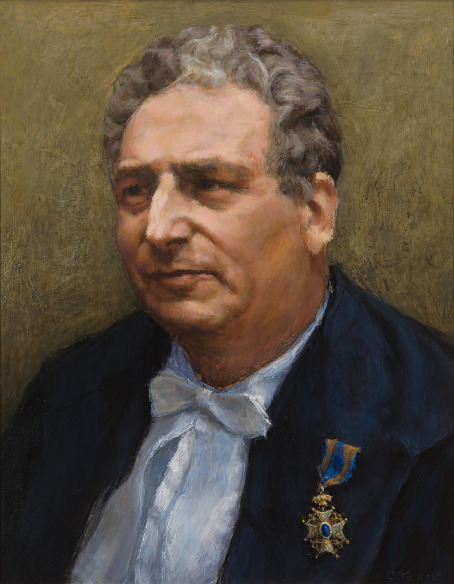
Professor of Educational Studies at the University of Groningen (1964-1981)
For almost twenty years, Leon van Gelder was professor of Educational Studies at the University of Groningen. The path he took to achieve this was that of a classic social riser. Growing up in a Jewish working-class Amsterdam family, the only way to get ahead in the 1920s and 1930s was to study for a teaching certificate. After Van Gelder obtained it in 1931, it was difficult to find a permanent job as a teacher during the crisis years due to budget cuts in education. During the Second World War, Van Gelder had to go into hiding. He used those years to study pedagogy. After the war, he became a lynchpin in the web of training work, renewal education and the teachers' union. He became director of the General Pedagogical Centre, which aimed to professionalise teachers and promote educational innovation. Besides pedagogy, Van Gelder also studied psychology, became a school psychologist and, in 1953, obtained his doctorate with an orthopaedic study on the diagnosis and treatment of children who got stuck in education. In 1964, he became the first professor of Educational Studies in the Netherlands.
The main pillars of Van Gelder's work were the professionalisation of teachers and educational policy for greater equity of opportunity. For the former, with the cooperation of many colleagues and students, he developed the Didactic Analysis model, which was elaborated in a book in 1974 and became an important guideline for generations of teachers. In addition, from the 1950s Van Gelder was already engaged in research into ways of promoting social ascendancy for children from lower social backgrounds and thus creating more equality of opportunity. He advocated the introduction of a middle school, a form of secondary education in which children in heterogeneous classes could postpone their choice of school for three or four years after primary school. Groningen decided to be one of the first to establish such a Middle School. The Leon van Gelder School, where children with different levels sit together in class and can develop at their own pace and in their own direction, still exists.
The Van Gelder building can be found at Grote Rozenstraat 3 and currently houses the Department of Educational Sciences and the GION.
Gerard Heymans
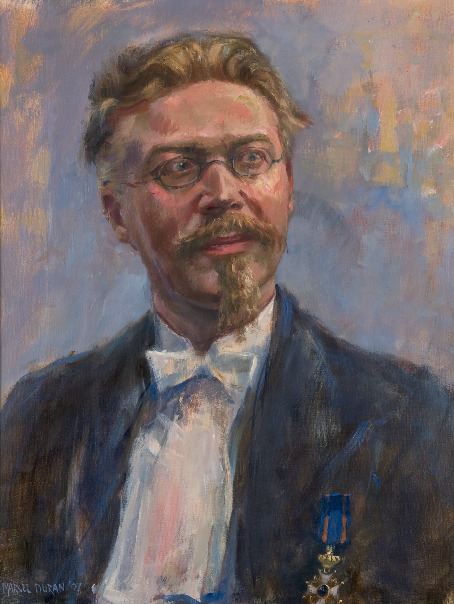
Professor of Philosophy at the University of Groningen, teaching committment ‘Science of the Soul’(1890-1927)
Gerard Heymans is considered the founder of Dutch psychology. Born in Ferwert (Friesland), Heymans first studied law and philosophy in Leiden and then in Germany, where he obtained his doctorate with Wilhelm Windelband in 1881. In 1890, he was appointed professor of Philosophy in Groningen. This gave Dutch psychology academic status. Heymans was convinced that scientific laws could also be formulated for psychological processes, as in physics. In 1892, Heymans started setting up the Psychological Laboratory, where he was the first in the Netherlands to conduct empirical research on the soul. In the early years, his research focused mainly on psychophysics, the relationship between sensory stimuli and sensations. In doing so, Heymans used various devices.
In his classic ‘Heymans Cube’, he reduced character traits to three dimensions: activity, emotionality and primary-secondary. An English translation explaining Heymans' theory of the cube by Rinske Vermeij and Corné Vroomen was published in 2023. Heymans published many articles and some books, mostly originally in German. He also had special interests in the psychology of different ages and the psychology of women. He conducted the first large-scale survey in the Netherlands among young people, the so-called ‘school survey’, and published a thick book on the psychology of women. As rector magnificus of the RUG, Heymans delivered his famous speech De toekomstige eeuw der psychologie (The future century of psychology) in 1909. In it, he outlined a distant future in which a mature psychological science could solve many of mankind's problems.
The Heymans building can be found at Grote Kruisstraat 2-1 and currently houses the Department of Psychology.
Benjamin Kouwer
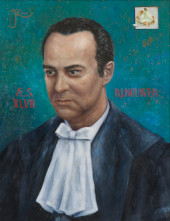
Endowed professor of Applied Psychology at the University of Groningen (1955-1968)
Benjamin Kouwer initially studied chemistry in Utrecht, but switched to psychology after his candidate examination. For some time, he worked for the Dutch Foundation for Psychotechnology and the Institute de Biométrie in Paris. Back in Utrecht, Kouwer obtained his doctorate in 1949 with F.J.J. Buytendijk for a psychological study on colours: Colors and their character. He worked at Utrecht University as a researcher and test leader until 1955, where, together with his colleague J. Linschoten, he produced a frequently reprinted introduction to the subject. His survey work Tests in psychological practice also appeared during this period. In 1955, Kouwer was appointed endowed professor of applied psychology in Groningen, combined with the directorship of the Groningen Institute for Applied Psychology and Psychotechnics. Kouwer had an ambivalent attitude towards psychology, as expressed in his oration Conscience problems of applied psychology. In it, he argued that ‘practical psychology’ concerned with testing and diagnosis was ethically dangerous.
In 1963, he published Het spel van de persoonlijkheid (The Game of Personality), on which Kouwer had worked for years. Because Kouwer was an entertaining narrator, the book has been described as a page turner. It became a cult book that caused uproar but was also touted by many psychologists. It remained a standard work on personality theory for decades. Kouwer spits through the history of thinking about personality in search of an answer to the question ‘What am I?’. He ultimately concludes that the ‘self’ does not exist. Benjamin Kouwer died of a heart attack in 1968. Kouwer's pupil and successor Willem K.B. Hofstee called him the most brilliant psychologist since Gerard Heymans.
The Kouwer Room is GMW's largest lecture hall and can be found in the Munting Building at Grote Kruisstraat 2.
Hendrik Nieuwenhuis
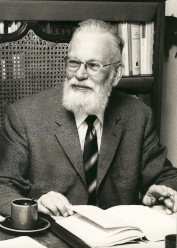
Professor of Pedagogy at the University of Groningen (1953-1970)
When Hendrik Nieuwenhuis, who grew up in Friesland, went to study ‘Opvoedkunde’ in Amsterdam in the early 1930s, pedagogy was still part of the study of Philosophy and hardly any empirical research was done. Trained as a teacher and with years of experience as a schoolmaster and nursery school teacher, Nieuwenhuis had seen that the school subject matters by no means always matched the world of children. He wanted to shift the focus within the field to empirical pedagogical research for the benefit of educational practice. He became the first professor of Pedagogy at the University of Groningen in 1953. At the time, he was also director of the Pedagogical Centre in The Hague and involved in a large-scale national study of post-war youth, who were feared to ‘drive wild’ under the influence of secularisation, shifting authority and mass culture (radio, cinema, television). According to Nieuwenhuis, education therefore needed to pay much more attention to personality development.
For Nieuwenhuis, education primarily had a social function; children had to learn to become responsible members of society. Personal development was more important than general development or knowledge and skills in preparation for higher education. In his book Algemene inleiding. Grondslagen en begrippen van vernieuwing in het onderwijs (General introduction. Foundations and concepts of innovation in education) (1959), which was on the syllabus of teacher training courses and university pedagogy courses for twenty years, he focused on the relationship between school, culture and society and argued for more empirical research into how sociology and (developmental) psychology could contribute to a child-oriented didactic approach for ‘the entire Dutch youth’.
The Nieuwenhuis Building can be found at Grote Rozenstraat 38 and currently houses the Department of Pedagogical and Educational Sciences.
| Last modified: | 29 August 2024 1.32 p.m. |


